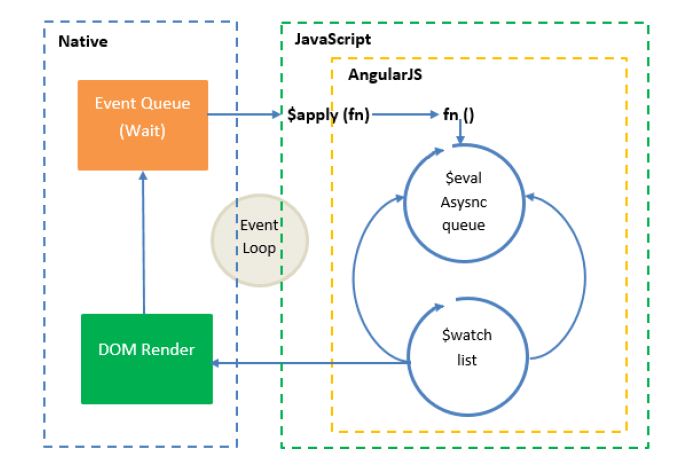The digest loop is responsible to update DOM elements with the changes made to the model as well as executing any registered watcher functions.
The $digest loop is fired when the browser receives an event that can be managed by the angular context. This loop is made up of two smaller loops. One processes the $evalAsync queue and the other one processes the $watch list.
The $digest loop keeps iterating until the $evalAsync queue is empty and the $watch list does not detect any changes in the model.
The $evalAsync queue contains those tasks which are scheduled by $evalAsync() function from a directive or controller.
The $watch list contains watches correspondence to each DOM element which is bound to the $scope object. These watches are resolved in the $digest loop through a process called dirty checking. The dirty checking is a process which checks whether a value has changed, if the value has changed, it set the $scope as dirty. If the $scope is dirty, another $digest loop is triggered.
When you do the changes to the scope outside the angular context, you have to call $apply() function explicitly on the scope to trigger $digest cycle immediately.
$evalAsync - This executes the expression on the current scope on later time. The $evalAsync makes no guarantees as to when the expression will be executed, only that:
1. If code is queued using $evalAsync from a directive, it will run after the DOM has been manipulated by Angular, but before the browser renders.
2. If code is queued using $evalAsync from a controller, it will run before the DOM has been manipulated by Angular and before the browser renders.
The $digest loop is fired when the browser receives an event that can be managed by the angular context. This loop is made up of two smaller loops. One processes the $evalAsync queue and the other one processes the $watch list.
The $digest loop keeps iterating until the $evalAsync queue is empty and the $watch list does not detect any changes in the model.
The $evalAsync queue contains those tasks which are scheduled by $evalAsync() function from a directive or controller.
The $watch list contains watches correspondence to each DOM element which is bound to the $scope object. These watches are resolved in the $digest loop through a process called dirty checking. The dirty checking is a process which checks whether a value has changed, if the value has changed, it set the $scope as dirty. If the $scope is dirty, another $digest loop is triggered.
When you do the changes to the scope outside the angular context, you have to call $apply() function explicitly on the scope to trigger $digest cycle immediately.
$evalAsync - This executes the expression on the current scope on later time. The $evalAsync makes no guarantees as to when the expression will be executed, only that:
1. If code is queued using $evalAsync from a directive, it will run after the DOM has been manipulated by Angular, but before the browser renders.
2. If code is queued using $evalAsync from a controller, it will run before the DOM has been manipulated by Angular and before the browser renders.


No comments:
Post a Comment